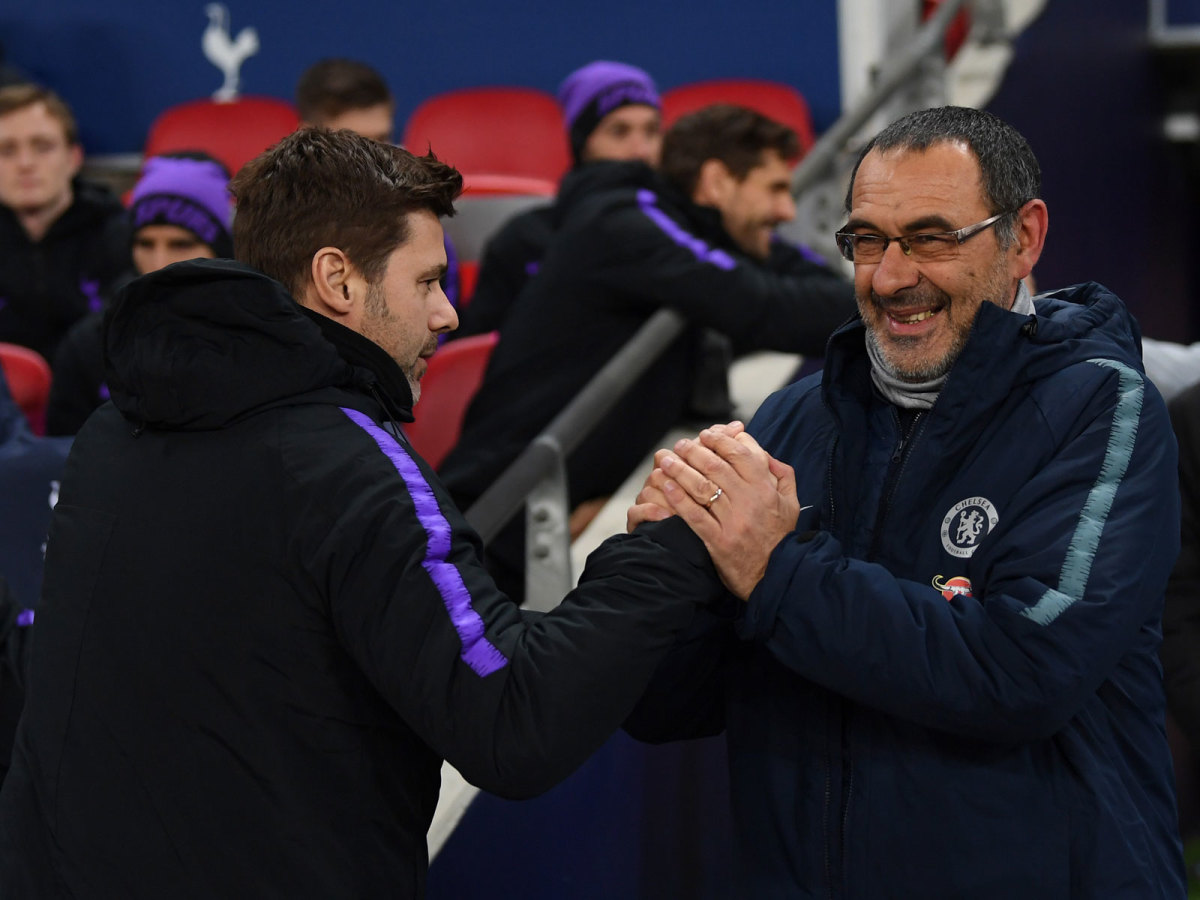Mauricio Pochettino's Uncertain Tottenham Future and the Real Value of Winning a Trophy

It was nothing like as convincing as the league victory over the same opposition, but Tottenham took a step toward the League Cup final on Tuesday with a 1-0 win over Chelsea in the first leg on Tuesday, and Mauricio Pochettino is that little bit closer finally to winning his first piece of silverware as a manager.
That Harry Kane had been fouled by Kepa Arrizabalaga after 24 minutes was not in doubt–the only question was whether he had been offside as he latched onto Toby Alderweireld’s through-ball. VAR confirmed he was onside, the penalty was given and the spot kick converted by Kane, who moved above Cliff Jones to become, at 25, Tottenham’s fourth leading goalscorer of all time. But this was not the hammering of two months ago. Chelsea posed a threat and Tottenham still has work to do in the second leg to secure its place in February’s final.
The criticism that Pochettino has to win a trophy has always seemed a strange one. Trophies, of course, should be the aim–even at this particularly money-obsessed time in a particularly money-obsessed sport–but to focus solely on that seems willfully reductive.
WILSON: Man City Reopens Title Race By Finest of Margins
After all, who was the last Tottenham manager to win silverware? It was Juande Ramos, who lifted the League Cup in 2008. Does anybody think he was a better manager for Tottenham than Pochettino is proving to be? Or look down the list of FA Cup winners. Of the last 12 managers to win that competition, the only one still to be in a job a year later was Arsene Wenger (and even he went a year after his final triumph in the competition). Cups do not save jobs, so there’s something vaguely absurd in suggesting they should define careers. Jurgen Klopp is in his fourth season at Liverpool but hasn’t yet won a trophy. Would anybody there rather return to Kenny Dalglish, who won the League Cup in his final season as manager?
For better or for worse, modern football is obsessed by the moment. Not what happened a few months ago–as Claudio Ranieri found when he was sacked nine months after winning the Premier League at Leicester–but what is happening now and what it seems might happen in the future.
The chief value of the domestic cups–to elite sides at least–is symbolic. Maurizio Sarri could probably do with a trophy–he has never won one in his career–although for slightly different reasons to Pochettino. After a highly promising start, Chelsea has stuttered of late and has a point less than Antonio Conte’s side did at the same stage last season. Conte capped the season with an FA Cup. There’s still a general sense of progress under Sarri, of a new style being implemented, but there is a danger of the season ending up looking rather worse than last year.

In terms of the now, Pochettino is almost unimpeachable. Tottenham sits third in the table and has reached the last 16 of the Champions League. Spurs brushed Tranmere aside in the third round of the FA Cup and has the advantage in the League Cup semis after Tuesday's win. And all that with a budget a fraction of any of his direct rivals.
That is why Pochettino is so in demand, why he is the obvious first choice for Manchester United next summer and why Real Madrid is clearly also interested. It’s also why his words earlier this week should be a matter of such concern for Tottenham. He talked about the lure of a 20-year career at one club, but also of the sadness of how Wenger’s time at Arsenal ended, drawing a clear comparison about the restraints imposed on a manager by a move to a new stadium.
Although Pochettino clearly has deep affection for Tottenham, this was a man considering his future, thinking of potential legacies. And amid all the sentiment, the conclusion was stark.
“If we want to be real contenders,” he said, “we need to operate in a different way in the future. At the moment it’s fantastic–so far so good–but we’ll see if it’s enough to challenge and be consistent in the next five years operating in that way; if we’re capable of fighting with the big sides in the same way that we’ve fought in the last four or five years.”
WAHL: Inside the Reasoning and Potential of Pulisic's Chelsea Move
That seemed a fairly obvious warning to the board, not that it can be unaware of Pochettino’s frustrations. And that, perhaps, is where a domestic cup could be valuable to him, not so much for what it means in itself but in what it may signify for the future. If there is a criticism of Pochettino at Tottenham, it is that his side has tended to falter in crunch games.
There was the second-half capitulation at Stamford Bridge in the 2-2 draw that handed Leicester the title, there was defeat to Chelsea in the 2015 League Cup final and perhaps most damningly of all, there was the tame surrender to Manchester United in the FA Cup semifinal last season. This is perhaps a particular issue for Tottenham, because it fits the narrative of Spursiness, the sense that it will always lose its nerve at key moments. Pochettino’s last challenge, in a sense, is to eradicate that.
Holding its nerve in the second leg vs. Chelsea will be the next test of that–and then, perhaps, a final. And then perhaps, at last, the endless conversation around Pochettino will change.
